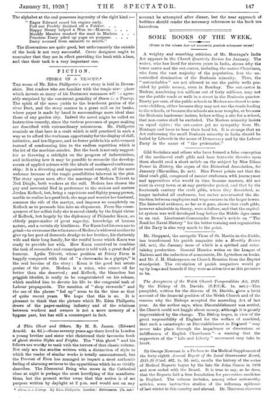FICTION.
STORM IN A TEACUP.*
Tiaz scene of Mr. Eden Phillpotte's new story is laid in Devon- shire. But readers who are familiar with the tragic atne- phere which invests so many of his Dartmoor romances will Le agree- ably surprised by the consistent geniality of Storm in a Teacup. The spirit of the moor yields to the beneficent genius of the river Dart, and the story centres in a great mill on its banks, where paper is made by hand in surroundings more ideal than those of any garden city. Indeed the novel might be called an Instructive comedy, since the various processes of paper-making are described with extraordinary minuteness. Mr. Phillpotts reminds us that here is a craft which is still practised in such a -way as to afford the workman opportunity for the display of skill,' initiative, and intelligence, and to foster pride in his achievement instead of condemning him to the endless repetition which is the lot of the machine-minder. But the book is not only suggest- ive as throwing a sidelight on the progress of industrialism, and indicating how it may bo possible to reconcile the develop- ments of applied science with the ideals of mediaeval craftsman- ship : it is a diverting and ingenious rural comedy, all the more welcome because of the tragic possibilities inherent in the plot. The story opens soon after the marriage of Medora Trivett to Ned Dingle, both workers at the mill. Medora has chosen the gay and mercurial Ned in preference to the serious and austere Jordan Kellock, but, being a capricious andflighty young person, tmable to realize her good luck, she nags and worries her husband, assumes the role of the martyr, and imposes so completely on Kellock as to persuade him into an elopement. From the conse- quences of her selfish folly she is saved chiefly by the frigid virtue of Kellock, but largely by the diplomacy of Philander Knox, an elderly paper-maker of great sagacity, knowledge of human nature, and a certain sly kindliness. For Knox had his own axe to grind—to overcome the reluctance of M.edora's widowed mother to give up her post of domestic drudge to her brother, his slatternly wife and their long family, for the restful home which Knox was ready to provide her with. How Knox contrived to combine the task of reconciler and emancipator is told with a great deal of humour. Lydia Trivett, whose position at Priory Farm is happily compared with that of "a cheeseeake in a pigstye," is the real heroine of the story : Knox is the good but astute genius of the plot. Medora is a minx, who comes off far better than she deserved ; and Kellock, the blameless but priggish idealist, is really to be congratulated on his release, which enabled him to devote his life to the congenial task of Labour propaganda. The mention of "shop stewards" and the use of the phrase "fed up" seem to fix the time as that of quite recent years. We hope that this is so. It is pleasant to think that the picture which Mr. Eden Phillpotts draws of the paper-teakieg industry and of the relations between workers and owners is not a Imre memory of a bygone past, but has still a counterpart in- fact.


































 Previous page
Previous page